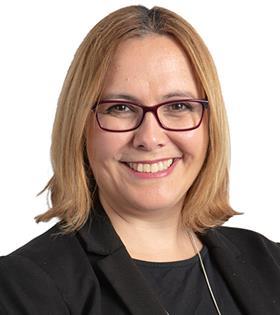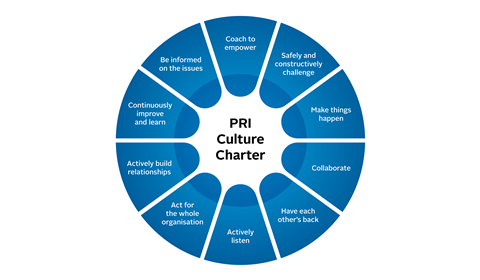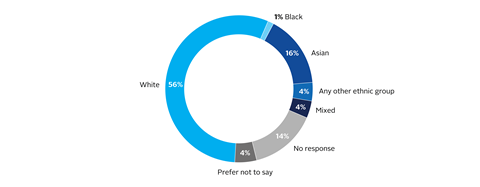
Message from Lian Hillier, Chief People and Culture Officer
The PRI is hugely reliant on the quality and performance – and by extension, the wellbeing – of its people, which is why our employee engagement surveys are always a big moment for the organisation. Understanding the experience of working at the PRI – including how it varies across different functions, by seniority and for different demographic groups – is a crucial first step for ensuring we are maximising the effectiveness of our people, to in turn deliver value for signatories.
This year’s survey saw some scores we were tremendously proud of – not least the participation rate, which at 94% surprised even our survey provider, and in itself indicates the high degree of involvement that employees feel with the PRI as an employer. We saw really encouraging responses from people about their pride to work for the PRI, their managers caring about their wellbeing and the strong working relationships they felt in their teams – amongst many more.
Building the right culture
But measuring employee engagement is not about patting ourselves on the back – it is about identifying areas where we can improve the employee experience, thus driving the performance of the organisation.
One of the key areas that we’re engaged in developments is creating a culture that encourages honest, productive feedback (even – or perhaps, especially – when that feedback is difficult). We’ve rolled out training on giving and receiving feedback for all employees, and on taking a coaching approach to management for senior managers, to help stimulate high-quality peer-to-peer and top-down feedback, to drive improvements in how we operate and the service we provide.
Our people and our culture are two of our greatest strengths as an organisation.
Diversity, equity and inclusion
Building a diverse employee base, and an equitable and inclusive experience for all employees, is of course crucial to our performance as an organisation and the wellbeing of our people. We saw some encouraging indicators from our first diversity data and pay gap report – such as the relatively even gender split at senior levels, as well as some areas where we need to improve, such as ethnic diversity in those positions. We’re reviewing our recruitment strategy to explore opportunities to source a diverse pool of candidates for open roles, with a particular focus on more senior positions.
We will continue to review our core processes – including across recruitment, promotions and performance assessment – for greater consistency, building equity into the employee lifecycle. We will continue with training and events, particularly including support for managers on topics such as psychological flexibility, inclusive recruitment, creating an inclusive team environment and developing more junior employees, which will support overall organisational progress against these targets.
We also need to do everything we can to ensure employees are comfortable sharing their experiences with us, and trust us to be equitable in our approach. While we saw very high rates of completion for demographic data, those who did prefer not to share it recorded significantly lower scores than others across the survey.
Embedding a new executive team
For the year ahead, enhancing the relationship between employees and the, relatively new, executive team is a clear priority. We’re looking to ensure all teams feel effectively represented within the executive team, and that employees see clear accountability at that level. We will be working to increase the visibility of the executive team – developing more forums for listening to our people and ensuring a consistent cascade of information back.
We continue to believe very strongly that our people and culture are two of our greatest strengths as an organisation, and we remain committed to doing everything possible to make them the best that they can be.
Employee engagement
Monitoring the connection our employees have with the PRI
We undertook our latest employee engagement survey in late 2022, to get a steer on how we are performing as a place to work. We were delighted to see 94% of employees participating in the survey, providing a robust picture of sentiment across the employee base.

Our headline engagement figure of 68% demonstrates a positive overall sentiment, although based on our own high standards we would certainly like to see this figure even higher. In particular, the score puts us 4% lower than a benchmark comprising the types of financial services organisations our employees typically move on to.
Breaking down the engagement score into its component parts tells us a little more about employee sentiment. Pleasingly, nearly 90% of employees rate the PRI as a great place to work, and somewhere they feel proud to work. However only half say that they rarely think about looking for work elsewhere and that they still see themselves at the PRI in two years’ time. This aspect of turnover has always been a double-edged sword for the PRI – we of course wish to retain good people to drive the organisation’s effectiveness, but also recognise that employees moving into other roles within the responsible investment industry, as is typically the case, can also drive the PRI’s ultimate mission forward.
We have run several focus groups with employees to delve more deeply into the nuance underpinning the scores received across the survey, to help us establish meaningful action plans. One specific step we will take is to strengthen the role of employee groups to provide regular upward feedback.
We see the insights drawn from the PRI in a Changing World consultation as a key step in enhancing clarity over what delivering value for our signatories looks like, and how that cascades through the organisation into the contribution made by every employee. The survey results have already fed into our thinking around a new operating model.
Performance and culture
Setting out what we expect from our employees
As part of our approach to performance management this year, we’ve introduced a new approach to priority setting to provide visibility for how the CEO’s priorities cascade down through the organisation to every employee, thus maintaining focus on the key areas of impact, across the board.
A shared priority given to all employees is “to demonstrate the skills, values and behaviours of the culture charter in everyday behaviour, positively contributing to the culture of the organisation”. Our culture charter outlines more than 50 specific actions we expect from employees, across ten over-arching areas.

Diversity, equity and inclusion
Diversifying our workforce and ensuring all our people feel respected and valued
A diverse workforce and equitable environment enables us to benefit from a mix of brilliant minds, working together as a team to provide fresh perspectives and innovative solutions, and ensures that we embody the values we promote.
All colleagues are responsible for creating an inclusive working culture – enabling differing viewpoints, knowledge and life experience to be heard throughout our everyday interactions.
Highlights of our diversity, equity and inclusion (DEI) progress to date, include:
| Our strategy | Key successes to date | |
|---|---|---|
| Inclusive culture | Enable all colleagues at the PRI to feel respected and valued, actively participating in building an inclusive culture. |
|
| Strong governance | Build the structures, policies and processes to embed accountability for DEI across the organisation. |
|
| Measure our impact | Develop a framework for DEI at the PRI so we can transparently benchmark our progress and take a data-driven approach. |
|
| Tell our story | Communicate a clear plan and narrative for DEI at the PRI, aligning our internal strategy and Walk the Talk programme. |
|
We are committed to communicating transparently about our progress, because we understand how important transparency is as part of holding ourselves to account. Accordingly, we published our first diversity data and pay gap report this year.

Our findings show we have good gender balance, and a comparably low gender pay gap, but we recognise the need to improve our racial/ethnic diversity, particularly at senior levels. As we have a relatively small workforce, we are also careful to try to understand instances where small sample sizes show up pay gaps that are due to legitimately differing roles within a small sample of employees, rather than indicating a trend or discriminative pay gap.
Targets
We set explicit DEI targets for the first time this year. We focused on gender and ethnicity, with the intention to look at other areas in future. The targets are not intended to encourage positive discrimination, but to focus on positive action.
We are disappointed not to have hit all our DEI targets this year, although organisational changes under our new operating model have interrupted our usual hiring and promotions processes. With that reorganisation in place, we can put an action plan in place to push for progress in the year ahead.
| Maintain a minimum of 50% female, gender non-conforming or non-binary employees at every level | Achieved |
| A year-on-year increase in our % of Black employees (from 1% at Aug 2022) | On track: 2% at 30 June 2023 |
| Black, Indigenous or People of Colour candidates to make up 30% of all new hires | 24%[1] across 2022/23 |
| Black candidates to make up 10% of all new hires | 6.25%[2] across 2022/23 |
| Black, Indigenous or People of Colour employees to make up 30% of all promotions | 20%[3] in latest promotions round (Feb 2023) |
UK pay gap data
Our ethnicity pay gap sees the median White employee pay being 20.8% higher than the median BIPOC employee, and the mean for White employees being 21.5% higher. This is driven by a lack ethnic diversity in senior positions across the organisation, and needs to be a key area of focus for us.
The median male pay is 15% higher than the median female pay (compared to an estimated 26.6% gap for the wider financial services sector[4]). Mean male pay is 10% higher than female. This isn’t driven by the gender composition of higher paying roles, where we have a relatively even split, but rather by having additional female employees in lower paying roles.
| % of women in each pay quartile | |||
|---|---|---|---|
| Lower | Lower middle | Upper middle | Upper |
|
65.8% |
56.8% |
56.8% |
47.4% |
We are proud of the near 50:50 male to female representation in the highest salary quartile, demonstrating that women are being supported to reach higher roles and enabling balanced representation at higher decision-making levels. At director level there is a pay gap in favour of women (-7.9% median and -12% mean).
As we only have a very small number of employees that identify outside of the binary male/female distinction, our aggregated analysis is only able to report in those terms. However, we recognise that not everyone’s gender identity fits within this binary distinction.
Menopause support
This year we launched our first Menopause Policy. We recognise that many people feel uncomfortable talking about the perimenopause and menopause, which means that some employees suffer in silence while experiencing a wide range of symptoms that can affect their physical as well as mental health. This is a workplace issue that everyone at the PRI has a role in supporting.
We therefore want to encourage employees to talk more about the perimenopause and menopause: for employees experiencing symptoms to feel they can ask for the help they need, for line managers to have the knowledge and confidence to provide support and to provide sources of additional help and information for all employees.
The policy is accompanied by a range of further support, including meno-well workshops for all employees and empathy training for managers.






